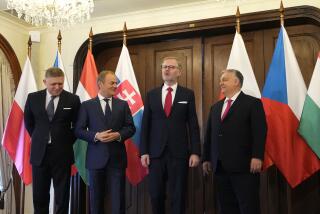TRADE : East Europe: Is the West Giving It the Business?
BRUSSELS — For the European Bank for Reconstruction and Development, whose job it is to help capitalism take root in Eastern Europe, the timing of Monday’s inaugural board meeting in London is less than auspicious. After the initial euphoria of freedom, Eastern Europe believes it is not getting the help it needs from its new friends in the West.
The world’s biggest companies, at one time thought likely to invest heavily in the newly opened markets of Eastern Europe, are staying away in droves. The potential profits, many of them calculate, do not justify the risks.
Nor are Western governments making it easy for Eastern Europe to join the world of private ownership and free markets. Western countries have been willing to direct foreign aid in the East’s direction but not so willing to buy Eastern products that compete with their own.
PRIVATE INVESTMENT: Westerners uniformly agree that the economies of Poland, Hungary, Czechoslovakia, Romania and Bulgaria need a large, quick infusion of Western corporate investment.
After more than four decades of Communist mismanagement, the new democracies of the East simply do not have the capital to pull themselves up by their bootstraps.
Some big Western companies, such as Coca-Cola and TRW, are going into the East in a big way. But they seem to be the exception.
“There is surprisingly little U.S. investment in Eastern Europe,” said Francine Lamoriello of KPMG Peat Marwick’s Washington office. Analysts say the same about companies in Western Europe and Japan.
“There is not enough investment in our country,” said Ivan Szasz, chief of Hungary’s mission to the European Community.
PUBLIC SUPPORT: Eastern Europeans are looking first to Western Europe--particularly to the 12-nation EC--for financial support. They say they are not finding enough.
To be sure, the developed countries have committed billions of dollars in the form of grants and, more commonly, loans. What galls the Eastern Europeans is that the West seems unwilling to give what is most needed: a place to sell their goods and earn hard foreign currency.
More than half of Poland’s exports to the EC are farm products, steel and textiles, all of which EC countries also produce in abundance. West European farmers and manufacturers think that is enough; Poland does not.
THE NEW BANK: It will be the principal task of the European Bank for Reconstruction and Development to improve conditions in Eastern Europe to the point where Westerners will want to do business there.
That would usually mean roads and bridges and telecommunications networks. But in Eastern Europe, it also means building legal systems and stock markets and other capitalist institutions that had no place under communism.
The bank has at its disposal about $12 billion from its 39 members; the 12 EC countries have a 51% share.
The United States weighs in at $1.2 billion.
Bank President Jacques Attali, a French economist, says the institution will have two main divisions, one to modernize Eastern Europe’s infrastructure and environment, the other to assist the process of turning public enterprises over to private hands.
More to Read
Sign up for Essential California
The most important California stories and recommendations in your inbox every morning.
You may occasionally receive promotional content from the Los Angeles Times.










